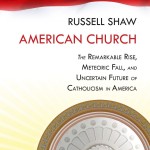All packed to come home and once again too excited to sleep! The Vatican/Blogger Meet-up was exceedingly well put-together, both panels were interesting– the second gave great information on i-developments coming out of the Vatican, and I believe most bloggers in attendance came away with a strong conviction that Rome is very serious about building a cohesive, co-operative relationship with the purveyors of Catholic social media.
It was a real treat to meet so many bloggers and writers whose work I have admired for so long — how adorable and smart is the UK Herald’s Anna Arco, anyone? In a word, incredibly! How smooth were Rocco Palmo and Thomas Peters? They only got applause almost any time they opened their mouths! How cool to meet Dame Catherine, or to get to know the youthful bloggers of France, who cooked up the pub crawl I was, alas, too tired to take part in, thanks to the worst insomnia, ever? It was all TOO cool, and I will be talking about and linking to everyone in attendance in the course of the next few days. I suspect I will be unpacking this trip, blogwise, for a little while, and if you are reading this on Tuesday, the 3rd, as I am flying home, you can read my take on the beatification at First Things
Below are the remarks I delivered at what I hope will be only the first such gathering:
Archbishop Celli, good fathers, religious and gathered colleagues;
What immense joy! Today we are in thanksgiving for the beatification of Bl. John Paul II, a pope who had an actor’s savvy understanding of media, messaging and the power of an image.
And his holiness was proclaimed by our dear Papa Benedict XVI, who — to the surprise of some — has been very quick to appreciate the transformative effect of social media upon how the world receives and processes information, both for better and worse.
Even as more-mainstream media outlets attempt to downplay blogs and blogging as being a force for nothing much beyond self-promotion, the pope has been ahead of the curve, urging priests, religious and lay folk to embrace social media as a powerful means of evangelization, and a source of Catholic clarity in a very noisy, confused and divided world.
Catholic clarity, of course, cannot be disseminated without a measure of charity, and charity can sometimes be the biggest challenge we face in new media.
The Internet is a place without genuine boundaries. Unlike a magazine, its ideas are not contained between two covers with defined limits; unlike a television or radio broadcast, it is not subject to the constraints of time, or, for that matter, reliant upon sponsorship and underwriters.
Such expansive freedom is both a gift and a terrible temptation to our egos, a force for disorientation and therefore a true battleground for souls.
If I may use an illustrative example, take the scourge of pornography.
This is a temptation of human objectification and imagination that has always existed, but previously a personal indulgence in this area has been necessarily constrained.
Someone who has been lured into the pages of a pornographic magazine may find their imagination ignited in a particular way but only, so to speak, cover-to-cover.
The internet, however, has no endpage; it accesses the infinity of the human mind and then assists in ego-driven distortions, and so a user of pornography, for example, is able to indulge deeper and more perverse imaginings, without ends.
He can even find fellow travelers with whom to chat and establish forums of discussion, where the ego can begin to believe that what is disordered has become normalized.
In a frequently visited echo chamber, the voice of the same 8 people can begin to sound first like 80 people, then like 800 people, until one falls for the illusion that “everybody” thinks as you do, that you are “mainstream” … when in fact you have travelled to the farthest margins of your humanity.
You are excused for wondering what the vagaries of Internet porn have to do with Catholic clarity or charity, but I use this extreme example in order to demonstrate something very common to the internet, which is the unintentional (and paradoxical) walling-in of our hearts and minds in a medium so vast, and how quickly the constricting of our views can diminish charity.
If you can convince yourself that the world is full of all the best sorts of people (the ones who read your blog) and that these best people all think the way you think, then you have created an illusion that there is an “us” and a “them,” — the people like you are the GOOD Catholics, who accept every teaching unquestioningly and therefore feel entitled to cry “shame” at the rest of us, or they are the SMART Catholics who wouldn’t dream of accepting anything out of Rome without first deconstructing it through the prism of the era; or they are the TOLERANT catholics who will put up with any idea, as long as it is theirs, or they are the TRUE Catholics, who think they can right every wrong if they can just smack the bishops back into line with a sword of rightiousness.
“They” are all of us. Catholicism contains fractious multitudes, and always has.
In a sense the church is as wide and deep as the Internet, but wisely constrained by the boundaries of 2000 years of well-wrought reason, and the Truth of Christ, which overcomes all of our illusions and pretenses.
Understanding that, bloggers and social media entrepreneurs have a duty to avoid the sort of narrowness of thought that is endemic to the echo chamber; we are fortunate to have a pope who has proved himself, in his book-length interviews with Peter Seewald and elsewhere, to be willing to put any idea throughout the wringer of Catholic analysis, because he is confident that a thorough discussion, rooted on the truth of Christ, will always lead us to the ends of Catholic orthodoxy, and so Pope Benedict is fearless and open, and in Christ’s truth, we can afford to be, too!
We do nothing to speed glory to the Body of Christ if we are selective toward whom we will and will not reach out.
We have no business fostering factions and enemies among ourselves, and I say this while admitting fully to my own failings, there
Let’s face it, when the ego is ignited and the passions are galloping, we all too easily ignore our own better angels, and sacrifice charity for the satisfaction of a what we consider to be a well-deserved jab at some poor misguided other.
Need I say, I go to confession a lot more frequently since I have been blogging. Bless me father, for I have sinned…it’s that damned editor at Commonweal, again…
And so it is a true gift, and a very wise thing for our hosts today to act on the urgings of the Holy Father in developing a relationship with bloggers.
The church needs us, to assist in evangelization; she needs us to disseminate information and especially to correct information which can often become distorted in the press, as when Pope Benedict discussed a very specific instance of condom use and the headlines blared, “Pope says condoms okay!”
The church needs us to be where the sheep are grazing, so that we may help them find the better pastures.
But you here in Rome, we need you, too — to keep reminding us that there is a wideness in God’s mercy; that conformity, if and when it comes, must always begin first from a place of freedom, because Christ freely died for us, and that faith wrought without freedom is worthless in the face of his gift, freely given. We need you to remind us that we are called, ultimately, to oneness, as Christ prayed that all may be one.
Yesterday at the beatification, Catholics from all around the world raised their voices and praised God in one joyful voice and language, “Gloria in excelcis deo, et in terra pax hominibus…” One need not be an advocate of the Latin mass to appreciate the power of that moment of demonstrated oneness and unity of purpose, despite out different backgrounds, our different economics, educations and perspectives.
Let us pray that as Catholic social media develops, that same unity, that same oneness may become its defining characteristic.
PANEL I
MODERATOR: Rocco Palmo
François Jeanne-Beylot
Andrés Beltramo
Elizabeth Scalia
P. Roderick Vonhögen
Matia Marasco
17.30 Pause
MODERATOR: P. Antonio Spadaro S.J.
P. Federico Lombardi S.J.
P. Lucio Ruiz
Thaddeus Jones
Eva Janosikova
Marco Sanavio











